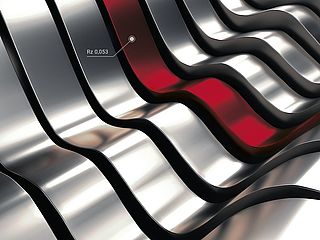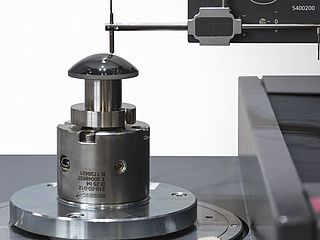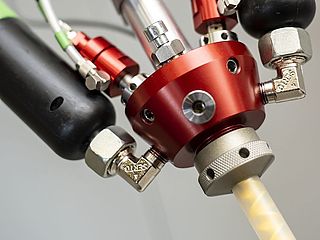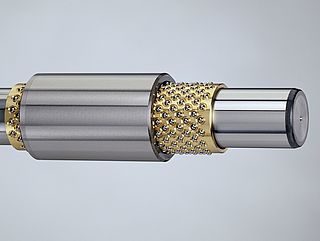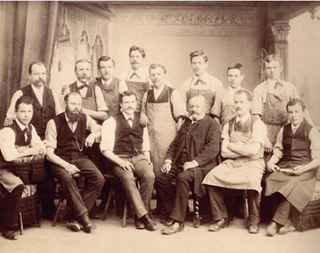Product conformity at Mahr
Our products help customers worldwide ensure the quality of their products. This is a big task and involves a high level of responsibility.
Both our products and the processes in our company are continuously and consistently aligned with the highest quality goals. This also includes compliance with national and international regulations on product safety requirements and technical market access requirements.
As a company that is aware of its social and ecological responsibility, we consider compliance with applicable laws and guidelines to be the basis of our integrity and a central component of our business.
The Restriction of Hazardous Substances (RoHS) Directive 2015/863/EU limits the use of lead, mercury, cadmium, hexavalent chromium, polybrominated biphenyls (PBB) and polybrominated diphenyl ethers (PBDE) to a minimum in electrical and electronic equipment whose functioning requires electric or electromagnetic fields and rated voltages up to 1,000 volts AC or 1,500 volts DC for their operation. Subordinate directive 2015/863 added the plasticisers di(2-ethylhexyl)phthalate (DEHP), butylbenzylphthalate (BBP), dibutylphthalate (DBP), diisobutylphthalate (DIBP) to the list of prohibited substances. Implementation came into force in 2019.
As a manufacturer of high-precision measuring technology, Mahr GmbH falls under category 9 of the RoHS directive. The RoHS conformity of our electrical and electronic products is ensured by suitable processes and is confirmed by the CE marking. Purely mechanical products are not affected by the RoHS 2015/863/EU directive.
As a manufacturer of measuring systems and measuring machines (products) within the meaning of the REACH Regulation, Mahr GmbH is considered a “downstream user.” According to REACH, the products are therefore not subject to registration.
The chemical substances and mixtures subject to registration used in the production and assembly of our measuring systems and components are essentially limited to very small quantities of lubricants and adhesives, as well as paints and varnishes. The substances used are subject to widespread applications and are used in large quantities in many industries. These must be registered exclusively by our suppliers. Based on the information available, it can be assumed that pre-registration or subsequent registration of the relevant substances will be carried out by the upstream suppliers.
Mahr regularly monitors the presence of substances on the SVHC candidate list in its products, which was published by the European Chemicals Agency in accordance with Articles 59(1) and 10 of the REACH Regulation. In particular, it monitors whether the limit of 0.1% by weight of substances of very high concern is exceeded.
In accordance with Article 33 of the REACH Regulation, Mahr complies with its information obligations towards its customers.
As a company that is aware of its social and ecological responsibility, we consider compliance with applicable laws and guidelines to be the basis of our integrity and a central component of our business.
Mahr GmbH is not listed on the US stock exchange and accordingly is not directly obliged to disclose or, as applicable, report on conflict minerals used. Mahr GmbH is not affected either by a direct link to the entire supply chain of US stock exchange-listed companies, as Mahr is not a supplier in the true sense. A supplier is an industrial operation or retailer which supplies companies with products, which the latter then sell on and/or process. Mahr GmbH develops, produces and distributes measuring equipment under its own brand name. These end products are needed for customers' production, but are not incorporated into their products. A statutory obligation corresponding to Sec. 1502 Dodd-Frank Act is not currently present at European level.
Even without specific statutory obligations, Mahr GmbH is fully aware of its supply chain responsibility. Mahr GmbH understands supply chain sustainability and responsible procurement of raw materials to be an obligation which we assume voluntarily. We consistently follow and rigorously adhere to applicable directives and regulations.
With regard to the Dodd-Frank Act § 1502, the Mahr Group is currently in the process of integrating appropriate processes to avoid trade in conflict minerals originating in Central Africa. Due to our diversity of materials, intensive contact with our well-known suppliers would be necessary to reveal the penetration of the complete supply chain. We cannot at present guarantee that conflict minerals will not be used, but we assure you that we will monitor the issue in accordance with the objectives of the Dodd-Frank Act § 1502.
Manufacturers must subject lithium batteries and lithium cells to various safety tests before they can circulate them on the market. This also includes the so-called UN 38.3 test. This simulates transport conditions such as pressure, temperature, crushing, impact etc. In the "Manual of Tests and Criteria" of the United Nations in Part III, Section 38.3 this is described with 8 test modules, which in some documents and data sheets are also referred to as T.1 to T.8 test.
From January 1, 2020, manufacturers and distributors along the entire transport chain are obliged to provide a test summary of this "38.3 test" to every natural and legal person in the supply chain. The audit report has been compulsory since as far back as 2000, but this was never part of logistics cooperation. Since January 1, 2020, this has been part of the hazardous goods regulations and part of the supply chain. The basis for this is the revision of ADR/RID/ADN 2019, subsection 2.2.9.1.7 (g), which states that "manufacturers and distributors of cells or batteries manufactured after June 30, 2003 shall provide the test summary set out in the Manual of Tests and Criteria, Part III, sub-section 38.3, paragraph 38.3.5".
The same requirement also applies to maritime and air transport. Here, too, the IMDG Code / IATA-DGR stipulates that the 38.3 test must be provided by the confirmed test summary. Every client of a transport is obliged to make sure that a test summary is available - this is required by law. Each consignor must ensure, when placing the order, that the conditions for transport are met.
In the list of products linked below, we fulfill our obligation and link all the necessary test summaries of the battery manufacturers we use for the product. If you have any further questions, our technical consultants will be happy to assist you.





